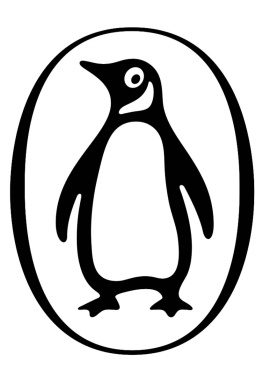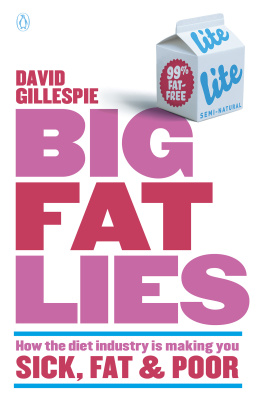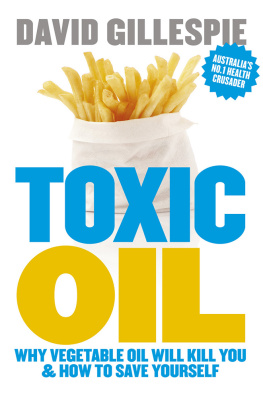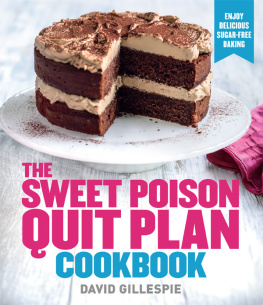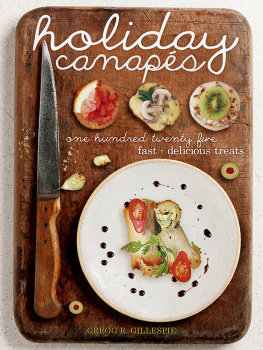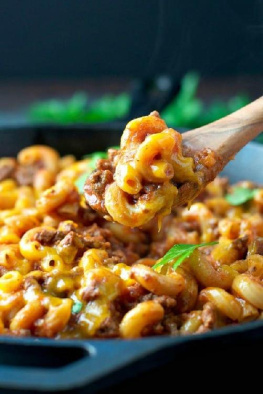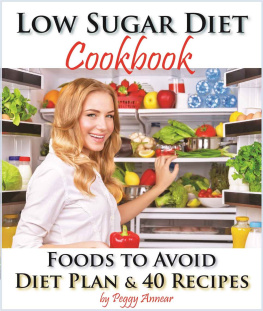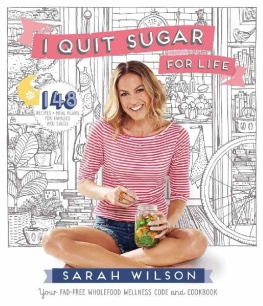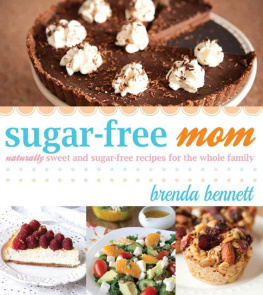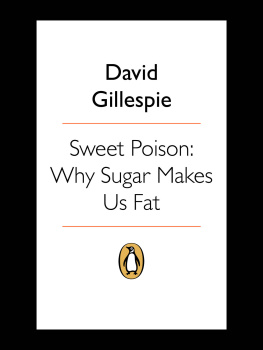THE
SWEET POISON
QUIT PLAN
DAVID GILLESPIE is a recovering corporate lawyer, co-founder of a successful software company and consultant to the IT industry. He is also the father of six young children (including one set of twins). With such a lot of extra time on his hands, and 40 extra kilos on his waistline, he set out to investigate why he, like so many in his generation, was fat. He deciphered the latest medical findings on diet and weight gain, and what he found was chilling. Being fat was the least of his problems. He needed to stop poisoning himself.
Davids first book, the best-selling Sweet Poison: Why sugar makes us fat, was published by Penguin in 2008. Find out more at sweetpoison.com.au.
PRAISE FOR SWEET POISON
An eye-opening read on the health implications of too much sugar in our diet. GOOD HEALTH & MEDICINE
Whats impressive about Sweet Poison is that Gillespie turns complex research on what happens to food inside our body and its relation to weight gain into a good read. SYDNEY MORNING HERALD
Comprehensive, thought-provoking and highly readable. THE AGE
David Gillespies groundbreaking book on the dangers of a high sugar intake could well revolutionise the way you diet. A CURRENT AFFAIR
Sweet Poison is a worthy and impassioned effort by an Australian dad to share his surprising discoveries with struggling dieters and provoke further debate about the obesity epidemic. AUSTRALIAN BOOKSELLER & PUBLISHER
Ive lost 11 kg without being on a diet. Its good to know this book is non-fiction. STEVE IRONS MP, MEMBER OF THE PARLIAMENTARY INQUIRY INTO OBESITY
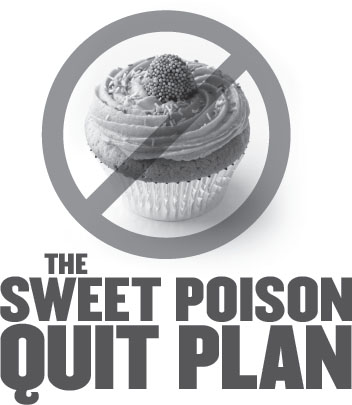
HOW TO KICK THE SUGAR HABIT
AND LOSE WEIGHT
DAVID GILLESPIE
VIKING
an imprint of
PENGUIN BOOKS
Introduction
Sugar makes you fat. It is converted directly to fat by your liver and it destroys your appetite control so that you want to eat more of everything. The more sugar you eat, the fatter you will be. If you stop eating sugar, you will stop gaining weight. Even better, you will start to lose weight dramatically. You will still eat as much as you want of anything you want as long as it doesnt contain sugar. And you wont feel deprived in any way. In fact, you wont feel like youre dieting at all because you arent.
I lost 40 kg by simply eliminating sugar from my life. Five years later, the weight is still gone. I didnt do that with a diet (no sane person could). All I did was eliminate the substance that was making me fat and sick: sugar. Theres just one little catch (you knew there had to be one, didnt you?). Sugar is as addictive as nicotine, so breaking its grip requires some techniques.
This book sets out a five-step plan for breaking your sugar addiction. None of it is painful or difficult. As long as you follow the rules, before you know it you will have broken your addiction and be on your way to a permanently slimmer and healthier you.
I dont remember my first taste of sugar and neither do you. Perhaps it was in your first feeder cup of diluted apple juice. Sugar is the only highly addictive drug that we feed to babies. By the time any of us are conscious of sugar, we are already well and truly addicted. Our brains have been hard-wired to seek out sugar as surely as the cocaine addict is wired to seek out stuff to sniff.
We dont think of sugar as an addictive drug. We dont have to meet chaps with questionable personal hygiene on street corners to acquire it. There are no warning labels on products containing it. And our health authorities even recommend that we consume it (in moderation, of course). But research tells us that sugar is highly addictive. Not in a smashed-out-of-your-brain, high-as-a-kite kind of way, but in a more subtle, deceiving, I-can-give-up-anytime-I-want kind of way a bit like nicotine.
Most smokers think they can give up their nicotine addiction easily. That is, until they try to do it. Then they discover there is nothing easy about giving up. But compared to someone addicted to sugar, a smoker has it very easy indeed.
A smoker is addicted to nicotine. Nicotine is found in cigarettes, cigars, tobacco and insecticide. Its not the kind of thing youre likely to come across by accident. Anyone consuming it is doing so very much on purpose. If you decide that you no longer wish to be addicted to nicotine, there is a very short list of things you should do:
- Do not put cigarette in mouth.
- If cigarette is discovered in mouth, do not light.
- Do not drink insecticide.
However, imagine how hard it would be to break an addiction to nicotine if it were in everything you ate and drank like sugar. Unlike smoking, eating is not optional.
This book is about how to break your addiction to sugar. My first book, Sweet Poison: Why sugar makes us fat, is all about the science of exactly how bad sugar is for us. In it I document my personal journey from ignorant fat guy to well-researched healthy guy. Im not a biochemist or a doctor. In fact, I have no medical training at all. I was simply a very overweight lawyer with a desperate need to know why I could never lose weight no matter how hard I tried.
I had to train myself to read medical journals, to understand what they were saying, and to recognise reputable research from unproven statements. I used my legal training to gather the evidence for and against the theory that sugar was the cause of many (if not most) of the chronic diseases we face today including my obesity.
I took notes so I could remember how it all worked and those notes turned into a book for people who want to know why sugar is killing them. Sweet Poison is also a case study (of one). It not only documents what the science says, but it tells the story of how I used my new knowledge to change my life. Ive summarised much of what I found in some of the first chapters of this book.
Sweet Poison doesnt, however, talk about the science of addiction. This is an area of medical science that has expanded significantly in the last few years. The main reason for this is that we are beginning to gain a much clearer understanding of the mechanics of the way our brain does its thing. And along with that understanding comes some very clear ideas about how to mess up these mechanics. Ill be talking about some of the recent studies on addiction as we get into the book.
Once Ive convinced you that sugar will make you fat, give you diabetes, clog your arteries and give you Alzheimers disease (to name just a few of its delights), I will show you exactly how to break your addiction to sugar. Breaking this addiction will not require willpower. And it will not require deprivation. It will, however, require rules that you will need to stick to. Once you break the addiction, you wont need the rules any more. Most people do not feel deprived of cocaine, nor do they have to exercise willpower to avoid purchasing it. This is because most people are not addicted to cocaine. Similarly, you wont need to exercise willpower around sugar or feel deprived when you dont have it once you break the addiction.
It makes such a difference not having to say I am trying a new diet again and again and yet again. I am sure my friends see me as the boy who cried wolf (or should that be the girl who tried diet?).
I have been sugar-aware for about 10 days, and have lost 2.5 kg fantastic! And its so easy. I am walking cos I enjoy it and have found a very low or sugar-free version of most things I like. Except chocolate there was some at work yesterday and, oddly enough, I wasnt even interested.

